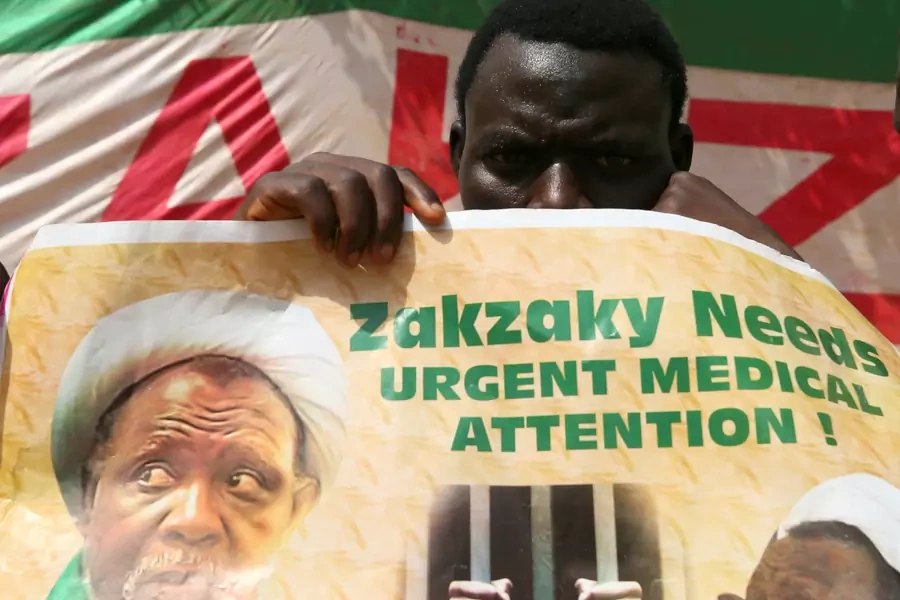The Zakzaky Saga Continues in India, as Sheikh Seeks Medical Treatment

In August, the ailing Sheikh Ibrahim el-Zakzaky and his wife, who have been in government custody since 2015, were allowed to receive medical attention abroad. He touched down in Delhi on August 13. His visit has been mired in controversy.
Zakzaky, the founder and leader of the Shia Islamic Movement of Nigeria (IMN), is a headache for the Buhari administration. He had been imprisoned following a clash between security services and an IMN procession in 2015, which led to the deaths of hundreds of his followers and some members of his family. A raid on his home then led to his arrest. During the raid, he and his wife were injured, apparently severely, and there had been concern that the injuries would be lethal. Since then, he has been in government custody. Authorities insist that he and his wife have been receiving medical attention. Zakzaky has never been tried, and there have been regular IMN demonstrations calling for his release, often accompanied by bloodshed. In April and October 2018, and July 2019, there were deadly clashes with the security services.
More on:
President Buhari overruled conditions imposed by the Kaduna state government regarding Zakzaky’s travel abroad for medical treatment. The site of Zakzaky and his wife’s arrest was Zaria, in Kaduna state, but the federal, not state, government has maintained custody over them. Apparently, Iran had been applying pressure on the Nigerian government regarding Zakzaky’s detention, and that played a role in the decision to allow him medical travel.
Spokespeople for the Nigerian government, the Indian High Commissioner in Abuja, and the IMN have made contradictory statements about the visit. The heart of the matter appears to be that Zakzaky wanted freedom of movement and association in India. In other words, he viewed his arrival in India as a release from captivity, and that he could resume his political activity. The Nigerian view appears to be that he was in India solely for medical treatment, as, apparently his visa status dictates. A Nigerian government spokesman says he demanded to be taken to a hotel, rather than a hospital, and he has vociferously objected to being surrounded by security personnel. Whether the security is Nigerian or Indian is unclear from the reporting; there are also conflicting reports about whether the Nigerian and Indian security are cooperating. Zakzaky is saying that his situation in India is worse than it was in Nigeria, complaining about the level of security he has around him, his freedom of movement, and his ability to choose his doctors. He says he will go back to Nigeria; in reply, Nigerian spokesmen are saying that when he returns, he will be subject to prosecution. It appears that he and his wife are not now undergoing medical treatment. In an audio he made and released to his Nigerian followers on August 14, he says that he and his wife have bullets and shrapnel in their bodies that must be removed.
Zakzaky is a charismatic preacher with followers ranging from a few hundred thousand to millions. He advocates the overthrow of the Nigerian state and the establishment of a Shia republic similar to that of Iran. Iran has provided him and the IMN with diplomatic support and, it is widely believed, a significant financial subsidy. By and large, the Shia are despised by the Sunni Nigerian establishment, many of whom have close ties to Saudi Arabia. IMN processions and parades often have led to bloodshed when security services become involved. Each side blames the other for instigating conflict, but the security services appear to have been consistently heavy-handed in dealing with the Shia. At present, Zakzaky does not advocate violence.
There must be a concern that the Shia will be radicalized, perhaps by security service abuse, perhaps by Zakzaky’s death in custody. But the government’s decision to allow Zakzaky to travel for health reasons, though the outcome is not yet clear, was a long overdue but important first step.
More on:
 Online Store
Online Store